
A Guide to Addiction Detox, Rehab and Mental Health Resources in Ammon, Idaho
Addiction detox, rehab, and mental health resources and programs are available to anyone who lives in Ammon, Idaho. Professional treatment can make a big difference, but there are many other forms of support in the local area. It is important for people to find what works for them when it comes to their mental health and addiction recovery. On this page, we’ve created a list of free and paid resources in and around Ammon.
Fortunately, there are plenty of addiction resources in Ammon, Idaho, in addition to alcohol and drug rehab and detox. There are recovery meetings, support groups, addiction specialists, treatment centers and more. No matter which substance you are struggling with, you can find the resources in Ammon with ease.
If you have an addiction to drugs or alcohol, you might experience some difficulty in finding the right addiction recovery resources in Ammon. The quality of a program matters not if you are unable to find it and utilize its services. We understand how trying it can be to find all the information you need, so we put together this handy guide for you to use. Virtually everything you need to find the right program can be found on this page.
Mental Health Resources and Treatment Options Near Ammon
Getting the right mental health support is so important. Bonneville County has several ways for people to get the help they need.
- Idaho 2-1-1 can be accessed by dialing 211 from any phone. Someone is there to answer at any time of the day or night. They provide information about local health and human services and organizations that can provide mental health support.
- The Teton Valley Mental Health Coalition is a wonderful resource for people searching for mental health support groups.
- The Idaho Department of Health and Welfare can assist people in finding substance abuse help and options for mental health services.
- The DoH in Idaho’s YES Program (Youth Empowerment Services) is there to offer support to families with children who need mental health services.
- NAMI Upper Valley Idaho can be a helpful resource for people looking for mental health services and support groups in the local area.
- Promise is a private mental health treatment program located in Boise, Idaho. They work with clients who have both acute and severe mental health issues and who have completed inpatient programs. They are a day treatment program.
The Idaho Suicide Prevention Hotline can be reached at (208) 398-4357. The hotline is staffed every day of the week, and they also offer text support between 3 pm and midnight Monday through Friday.
The National Suicide Prevention Lifeline is another option, and they can be reached by dialing 1-800-273-8255.
Ammon, ID Drug and Alcohol Addiction Help
Addiction is on the rise in the State of Idaho, and Ammon is no exception. Approximately 10% of the people who live there suffer with an addiction to either drugs or alcohol, and many of them don’t know where they can turn to get assistance. Addiction help in Ammon, Idaho is available to provide the needed support to those who want to recover from their addictions.
Get Help Today

Alcoholics Anonymous (AA) Meetings Near Ammon, Idaho
Alcoholics Anonymous (AA) is one of the first faith-based 12 step programs to ever grace this world. Those who join these meetings believe in a power greater than themselves. This doesn't necessarily mean that members have to be religious. Atheists, for example, will believe in the power of going to recovery meetings.
AA meetings follow twelve steps. The meetings include book studies, step studies, daily reflections and speaker discussions. New members are also paired with a veteran to form a mentorship type of relationship. This mentorship can help many new members learn how to stick with their goals and to abstain from all types of substances.
AA meetings are designed only to treat alcohol use disorders (AUDs). The only requirement to join is a desire to stop drinking. Researchers, students, family members and friends and the general public are welcome at open meetings. Closed meetings are reserved for recovering alcoholics only.
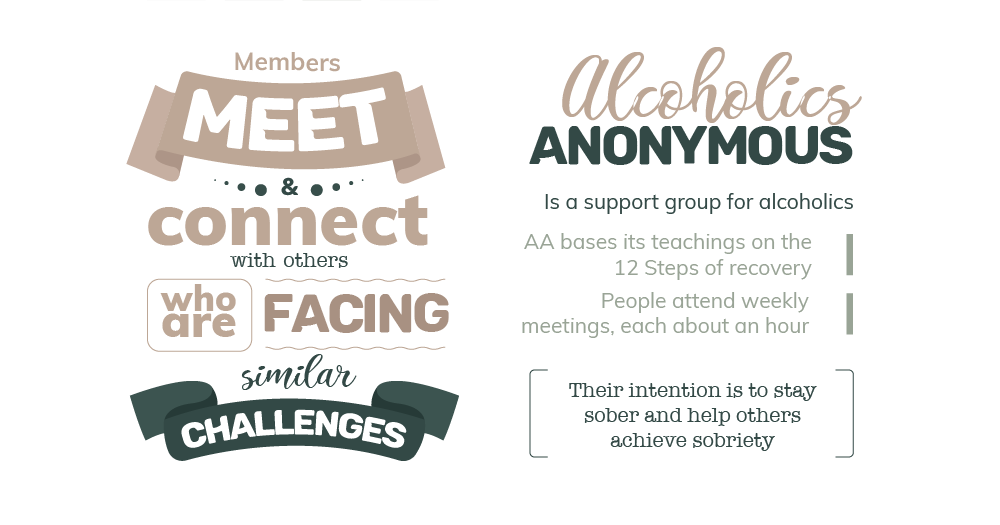
The information shared at these meetings will be kept 100% confidential. It will not be shared with anyone else. As a result, members feel more at ease and feel comfortable with sharing private and personal information. Venting these frustrations out can help ease inner guilt and shame.
These support groups also give recovering alcohol abusers a chance to bond with other people. Social and emotional support is a vital part of the addiction recovery process.
There aren't any AA meetings in Ammon; however, there are many different meeting times and locations in Idaho Falls. It takes less than 15 minutes to drive from the heart of Ammon to the downtown area of Idaho Falls. Check out the calendar below for AA meetings near Ammon.
Monday
Lunch Bunch AA
11:30 AM
950 Lindsay Blvd
New Hope and Inspiration Group
7:30 PM
2170 12th St
AA Study Group (Big Book)
8:00 PM
600 S Blvd
Tuesday
Grapevine Group
7:00 AM
600 S Blvd
Coffee Break Group
10:00 AM
600 S Blvd
Happy Meals
11:30 AM
2150 Channing Way
Just Stay
5:30 PM
600 S Blvd
Hope Group
7:30 PM
1501 Northgate Mile
Wednesday
Lunch Bunch Step Study Meeting
11:30 AM
950 Lindsay Blvd
Clean and Sober Group
6:00 PM
600 S Blvd
The Great News (Big Book Study)
7:30 PM
555 E St
Veterans Recovery Group
8:00 PM
600 S Blvd
Thursday
Grapevine Group
7:00 AM
600 S Blvd
Coffee Break Group
10:00 AM
600 S Blvd
Happy Meals
11:30 AM
2150 Channing Way
Just Stay
5:30 PM
600 S Blvd
Progressive Group
8:00 PM
600 S Blvd
Friday
Lunch Bunch AA
11:30 AM
950 Lindsay Blvd
Just Stay
5:30 PM
600 S Blvd
Great News
7:00 PM
793 Cleveland St
Lincoln Group
8:00 PM
600 S Blvd
Westside Group
8:00 PM
1900 Grandview Dr
Saturday
The Sunlight of the Spirit (for women)
8:30 AM
600 S Blvd
Coffee Break Group
10:00 AM
600 S Blvd
Clean and Sober Group
6:00 PM
600 S Blvd
The Buzz
7:00 PM
237 N Water Ave
Sunday
Spiritual Breakfast Meeting
8:30 AM
2150 Channing Way
Grapevine Group
9:00 AM
600 S Blvd
Reunion de AA en Espanol
5:00 PM
145 9th St
Turning Point Group
7:00 PM
600 S Blvd
Si Podemus
8:00 PM
145 9th St
Progressive Group
8:00 PM
600 S Blvd
Finding an AA near Ammon, ID that fits with your timetable can be difficult. Once you’ve made the right arrangements, make sure that you go to the same meeting as much as possible. This not only helps you develop a routine, but it also ensures that you stay motivated. Going to these support groups can help you feel alone when dealing with a drug or alcohol addiction.
Read The Latest Recovery News and Stories
Read great recovery stories, learn about the latest treatments, and find out how addiction affects yourself and your loved ones in our blog.
Read Our BlogNarcotics Anonymous (NA) Meetings Near Ammon, Idaho
Narcotics Anonymous (NA) meetings are created for those who struggle with a drug addiction. The program is very similar to the AA program. This 12 step program is also faith-based, which means that members put their faith in a power greater than themselves.
This does not necessarily mean that all members have to be religious. Atheists can attend NA meetings in Ammon, Idaho as well.
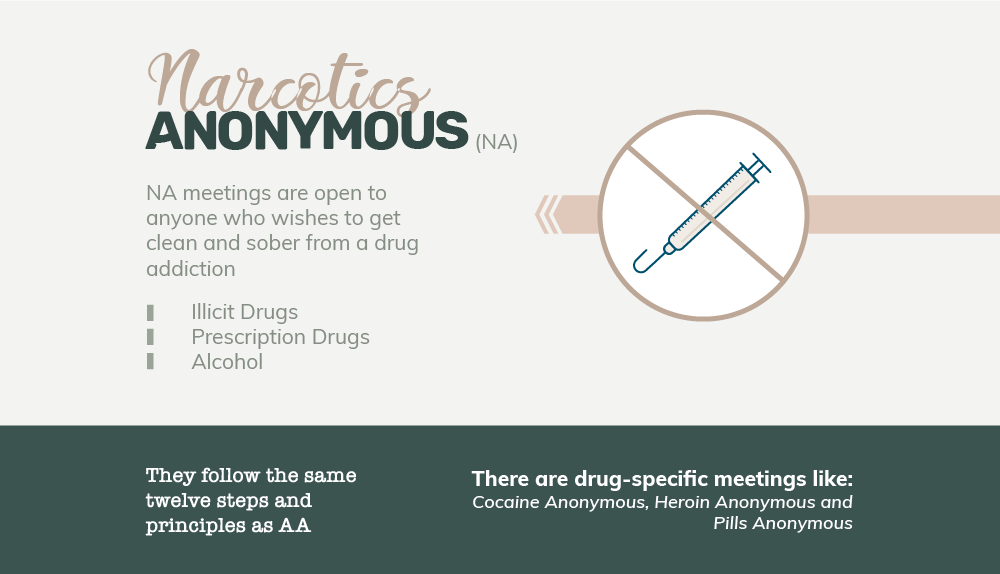
Narcotics Anonymous follows the same twelve steps as AA. The 12 steps of NA teach members how to be better individuals. Members learn how to:
- Become more self-aware of their actions and their addiction
- Avoid triggers and self-sabotaging situations that may result in relapses
- Make amends to those they have wronged and repair broken relationships
- Stay sober by using addiction recovery tools whenever he or she starts to crave drugs
There are many different types of NA meetings. Some NA meetings are designed to treat specific addictions. For example, there's Cocaine Anonymous (CA), Opioid Anonymous (OA) and Heroin Anonymous. Meeting types are similar to AA meetings. There are speaker discussions, daily reflections, step studies and more.
Unfortunately, there aren't many NA meetings hosted in Ammon, ID. The closest meetings are in Idaho Falls. These meetings are usually less than 15 minutes away when driving, so they're fairly easy to get to.
Check below for meeting times and locations.
Monday
Trinity Methodist Church
8:00 PM
237 North Water Avenue
Tuesday
Good Samaritan
8:00 PM
840 East Elva Street
Wednesday
Good Samaritan
7:00 PM
840 East Elva Street
Friday
Trinity Methodist Church
7:00 PM
237 North Water Avenue
Saturday
Crown of Life Lutheran Church
7:00 PM
3856 East 300 North
Serenity Hall
8:00 PM
600 South Boulevard
Sunday
Serenity Hall
6:00 PM
600 South Boulevard
Once again, it's often a good idea to go to at least one meeting a week. Try to go to the same meeting each week. This will help recovering addicts get acquainted with the members there. Those who are more familiar with the members will feel much more comfortable opening up.
12 step meetings are great at keeping recovering drug abusers sober. They help them connect with other people in the community, so they feel less alone.
More NA Resources
Al-Anon Meetings Near Ammon, ID
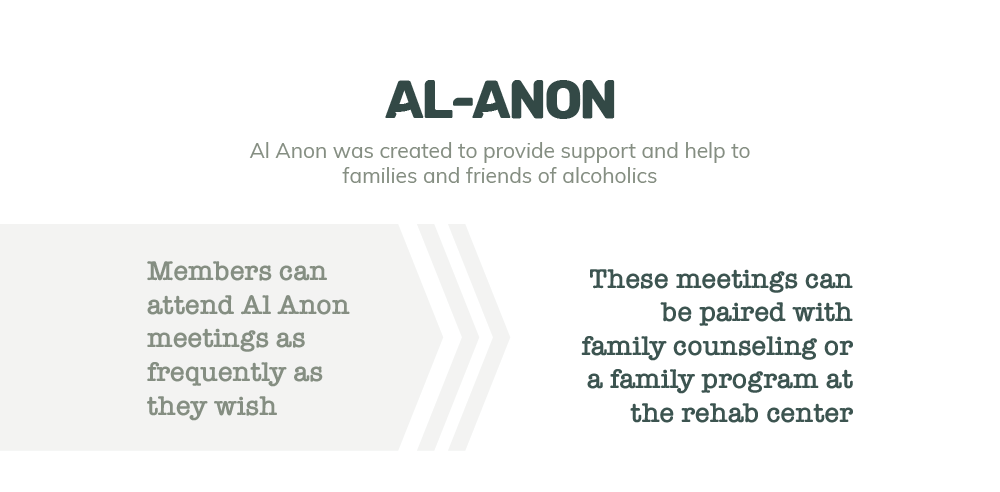
Al Anon was created to provide support and help for families and friends of alcoholics. Anyone whose life has been affected by an alcoholic is welcome at Al Anon meetings. These meetings can do the following for loved ones:
- Cover the 12 Steps involved with 12 step programs, like Alcoholics Anonymous
- Provide comfort and encouragement for families and friends
- Teach loved ones how to live healthy lives despite the alcoholic's decisions in life
- Avoid becoming an enabler and pushing a recovering alcoholic back into relapse
- Learn more about addiction and its effect on the body and mind
- Let go of any anger, guilt or frustration that he or she may have
- Practice what to do in the event of alcohol poisoning
- Vent out their feelings and frustrations to let off stress
- Learn tactics on how to relax
Members can attend Al Anon meetings as frequently and infrequently as they wish. Most experts recommend going to at least one meeting a week. These meetings can be paired with family counseling or a family program at the rehab center.
Once again, there aren't any Al Anon meetings hosted in Ammon, ID. The closest meetings are in Idaho Falls, which is about a 15-minute drive away. Check out the calendar below for Al Anon meeting times and locations.
Monday
Step Study Group
7:30 PM
2170 E 12th Street
Wednesday
Munch Brunch
12:00 PM
270 N Placer Ave
Thursday
Fresh Start
7:00 PM
290 7th Street
Friday
Just for Today
11:30 AM
793 Cleveland
Westside
7:45 PM
1900 Grandview Dr.
Family members and friends of recovering alcoholics should not hesitate to get help. There are many different support groups out there that can help these people. They can learn how to live a healthy and happy life without having to be burdened by the alcoholic.
More Family Resources
Alateen Meetings Near Ammon, ID
Teenagers and children often have special needs when a member of their family is suffering with alcoholism. Alateen meetings provide them with the unique support they need during this critical and trying time in their lives. This age group struggles with different problems than other age groups. They may have unique issues that need to be addressed in therapy.
Dealing with an alcoholic parent can feel quite overwhelming. Many teenagers or young adults may find that they're all of a sudden responsible for a lot of things. They may also need to be responsible for their parents.
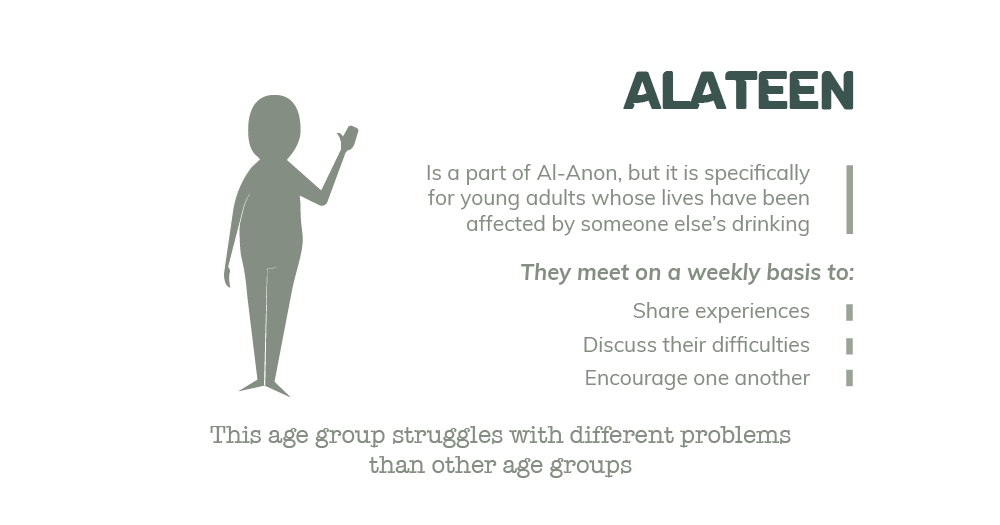
Learning how to break free from the influence of one's parents can be difficult. Many teens and young adults may find themselves compromising their future for the sake of their parents. That has to stop.
Alateen meetings in Ammon, ID helps teenagers and young adults navigate the murky waters of addiction. These meetings allow members to share their personal experiences as a way of venting their frustrations. These meetings also teach members how to live a happy life. It's important for teens and young adults to think for themselves. By putting themselves first, they'll have a better chance at escaping a poor family life.
Unfortunately, there aren't many Alateen meetings in Ammon, ID once again. With that said, there are some meetings hosted in Idaho Falls. Take a look at the meeting times and locations below.
Monday
High 5
7:30 PM
2170 E 12th Street
Idaho Falls is only a 15-minute drive away. There are buses that may take you near the meeting place. If you're interested in joining an Alateen meeting, you should consider talking to a trusted adult. He or she may be able to get you to the meeting.
More Alateen Resources

Are You Addicted? Take a Quiz
Take one of our addiction quizzes to find out if you or someone you care about needs help today.
SMART (Self-Management and Recovery Training)
There’s no need to forego addiction treatment because you believe you can’t afford it. There are laws in place to protect you, and to ensure that you’re able to get the financial help you need to be able to afford treatment. SAMHSA.gov provides you with information regarding the Affordable Care Act, and links to help make your transition into recovery much smoother.
While most rehab support groups and recovery meetings in Ammon have it at the center of their programs, a deep core of faith is not a requisite to getting this type of addiction treatment. Many people place their faith in science, and all of the advancements we have made in the past decades. This trend has contributed to the rise of a newer organization that requires no spiritual belief system in order to utilize its support services, SMART.
SMART bases its program on a scientific approach to self reliance and empowerment to get results in addiction recovery. SMART's outpatient rehab program requires no commitments on your part, and you are welcome to move on at any point you feel you are ready. The four points of their program include:
- Coping with Urges
- Building and Maintaining Motivation
- Living a Balanced Life
- Managing Thoughts, Feelings and Behaviors
There are no SMART meetings located directly in Ammon. The closest can be found in nearby Idaho Falls and Pocatello.
Sunday
Time: 6:30 PM
Location: Hope Recovery and Resource Center 210 E Center Street, Pocatello
54 miles
Tuesday
Time: 7:00 PM
Location: The Center for HOPE 1501 Northgate Mile, Idaho Falls
5.9 miles
Wednesday
Time: 12:00 PM
Location: The Center for Hope and Recovery 530 E Anderson Idaho Falls
6 miles
Time: 6:30 PM
Location: Hope Recovery and Resource Center 210 E Center Street, Pocatello
54 miles
Time: 12:00 PM
Location: Hope Recovery and Resource Center 210 E Center Street, Pocatello
54 miles
Friday
Time: 12:00 PM
Location: The Center of Hope 530 E Anderson Street, Idaho Falls
46.3 miles
Financial Assistance for Drug and Alcohol Resources and Treatment in Ammon, ID
There’s no need to forego addiction treatment because you believe you can’t afford it. There are laws in place to protect you, and to ensure that you’re able to get the financial help you need to be able to afford treatment. SAMHSA.gov provides you with information regarding the Affordable Care Act, and links to help make your transition into recovery much smoother.
Online Support Groups
- For those who are in search of additional support, various online support groups are available to provide help and assistance.
- Narcotics Anonymous
- SMART Recovery for self-managed recovery training
Dealing with a Drug Overdose or Alcohol Poisoning
Drug overdose deaths and alcohol poisoning is a common occurrence in Idaho. In 2015, 218 Idaho residents died from a drug overdose. 36% of these overdose deaths were attributed to prescription drug use. Out of all of the prescription drugs available, opioids are perhaps the most addictive and dangerous.
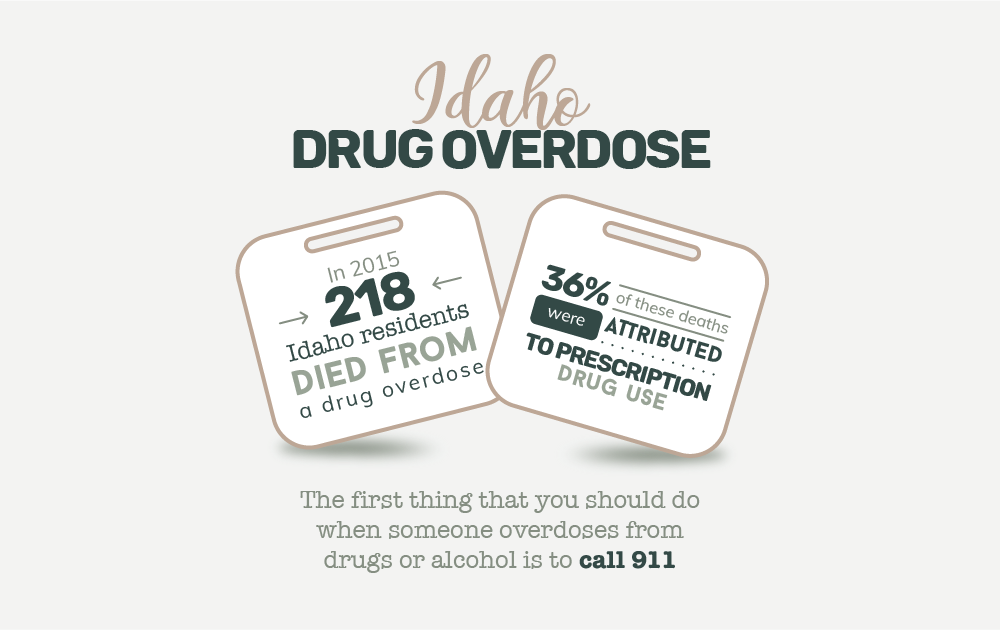
These numbers don't even include the amount of emergency room visits that were due to drugs or alcohol. Many people have sustained serious bodily damage from drug or alcohol abuse.
If you or someone you know is addicted to drugs or alcohol, it's vital that you're well-versed on what to do when the unexpected happens. Quick action may end up saving a life.
The first thing that you should do when someone overdoses from drugs or alcohol is to call 9-1-1. The overdose victim needs immediate and urgent medical attention. If they don't receive medical attention anytime soon, their condition may worsen. In extreme cases, they may end up dying.
Upon calling 9-1-1, provide the emergency responders with as much information as you can. This includes information like:
- The type of drug that was abused
- The frequency of the drug use, as well as when the last dose was taken
- Whether the overdose victim struggled with any mental health issues
- Whether the overdose victim may have taken more than one substance
- The type of symptoms that the overdose victim is experiencing
The more information that you can provide, the better.
Don't sit idle while waiting for the emergency responders to arrive. There's still plenty you can do to turn the situation around. You should consider:
- Assessing the overdose victims’ conditions periodically. Most importantly, you should check on their level of consciousness. If the overdose victims ever lose consciousness, put them in the recovery position. This position will prevent them from choking on their own vomit.
- Reassuring and comforting the overdose victims if they are still conscious. Let them know that help is on the way, and try to keep them as calm as possible until the emergency responders arrive. If the overdose victims are overheating, remove some of their clothing. Give them blankets if they feel cold.
- Gathering evidence for the emergency responders. Try to identify the type of drug that was taken. If the overdose victims are still conscious, ask them what dose was taken and when the substances were taken. Also, ask them about the method of administration, as this can affect how the body metabolizes the substances.
Dealing with an overdose can feel scary and overwhelming. The important thing is to stay calm and collected. Don't panic because you'll be more likely to make mistakes and overlook crucial information.
Stay with the overdose victims until the emergency responders arrive. You might want to clear a path from the doorway to the victims if possible. This will make it easier for the emergency responders to get to them.
Knowing how to recognize the signs and symptoms of a drug overdose or of alcohol poisoning may save a life. Not everyone may know when someone is overdosing. Some signs and symptoms of overdoses may look quite subtle.
Depending on the substance taken, the signs and symptoms of an overdose will differ. Also, not all overdose victims will present all of the symptoms and signs expected. Here are some of the most common signs and symptoms of an overdose:
- Abdominal pain
- Aggressive or violent behavior
- Bluish tint around the fingernails and lips
- Cold, clammy and pale skin
- Depression and/or suicidal thoughts
- Difficulties breathing
- Drowsiness, exhaustion or fatigue
- Extreme mood changes
- Irregular breathing patterns
- Psychosis, confusion or hallucinations
- Tremors or seizures
- Vomiting and nausea
You'll need to take a look at each drug information guide to get a better idea of what to expect from each substance. The type of signs and symptoms expected will depend on the neurochemical pathways that the drugs affect.
It's also important to note that the signs and symptoms of a drug overdose can differ if more than one substance is taken at the same time. The different substances may cross-react with one another. This makes it harder to spot an overdose.
What to Do in Event of a Heroin Overdose
Heroin has become an increasingly popular drug. Nearly 948,000 Americans reported using heroin in 2016. A large percentage of Americans who use heroin have switched over from prescription opioids. When their prescription ran out, they turned to illicit opioids, which are easily accessible and fairly inexpensive.
Heroin is a dangerous drug. It's easy to develop tolerance to this substance, and it can do a lot of damage to the body. It's also easy to overdose on heroin. Often, those around the overdose victim won't even notice that they're overdosing.
Someone who is overdosing on heroin will simply look like they're falling asleep. When they fall asleep, they'll stop breathing. An overdose leads to not only cardiac, but also respiratory depression and failure.
If you notice that someone is overdosing on heroin, you must act quickly. Heroin takes effect on the body quickly. You should:
- Get medical help immediately by calling 9-1-1. Now is not the time to hesitate.
- Check if the overdose victim is conscious or not. If he or she is unresponsive, place him or her in the recovery position.
- Perform CPR if the overdose victim ever stops breathing.
- Administer naloxone, the opioid-reversing antidote, as soon as possible.
Naloxone comes in two forms. It can either be injected into a muscle or it can be sprayed into the nasal passage. With both methods, the drug should take effect within 5 to 30 minutes. If no effect is seen, administer another dose of naloxone.
Stay with the overdose victim until help arrives. Keep him or her as comfortable as possible until then.
What to Do in Event of a Cocaine Overdose
Unlike with a heroin overdose, there's no antidote for a cocaine overdose. The signs and symptoms of an overdose also look quite different. Instead of experiencing cardiac failure, the overdose victim may experience cardiac arrest.
He or she may have higher than normal blood pressure. He or she may also become aggravated or aggressive.
Deal with a cocaine overdose differently by:
- Calling 9-1-1 as soon as possible for help
- Administering CPR if needed
- Using physical restraints to get the victim to calm down
- Getting as much information out of the victim as possible, like the dose taken and when the dose was taken
One of the most important things to do is to keep the overdose victim as calm as possible until help arrives. This may include removing any triggers that may upset him or her.
Keep the overdose victim as comfortable as possible until help arrives. Stay by his or her side until then.
What to Do in Event of a Prescription Drug Overdose
There are many different types of prescription drugs. For example, common prescription medications include:
- Barbiturates like Penthotal and Capcet
- Benzodiazepines like Xanax
- Opioids like oxycodone and hydrocodone
- Sedatives like Ativan or Valium
- Stimulants like Adderall or Ritalin
Depending on the medication taken, different signs and symptoms can be expected. Prescription drug abuse is actually a lot more common than what most people would think. Many people are under the misconception that these medications are harmless since doctors prescribe them. Unfortunately, some of these medications come with a potential for abuse and are addictive.
Depending on the type of prescription drug that is taken, different types of actions should be taken. In general, your safest bet is to call 9-1-1 for help immediately. Follow the instructions given to you on the phone. Also, place the victim in the recovery position if he or she ever loses consciousness.
Instructions will differ. For example, if the overdose victim took opioids. The operator may recommend that you administer naloxone if you have it handy. Naloxone will reverse the effects of the prescription medicine.
Get a High Level of Care with Inpatient Addiction Treatment
Most addiction specialists recommend a 28-day residential drug or alcohol detox and rehab program. An inpatient treatment facility offers the highest level of care possible. Patients receive around-the-clock supervision. All of their needs will be attended to at a moment's notice.
With an inpatient program, patients are expected to move to the drug or alcohol rehab center. They will stay at the facility until they complete their treatment. They won't leave the premises until then. This means that they will eat all of their meals at the facility, do their laundry there and, basically, spend all of their free time there as well. This is why it's important to look for rehab facilities that offer a lot of amenities and services.
Patients also receive medical detox services for drugs and alcohol at the facility as well. They also receive counseling and therapy there, as the counselors are on-site.
Residential inpatient treatment programs have the highest success rates. Patients, who complete these programs, are less likely to relapse. They’re also more likely to abstain from drugs and alcohol. They are highly recommended for:
- Those with a serious and severe addiction
- Patients who have already tried and failed another type of treatment program
- Addicts who are receiving treatment for the first time
These treatment programs can treat all types of addiction, from crack cocaine to prescription drugs. Those who are interested in this program should take a walk through each facility to see what it has to offer. Interested prospects should see whether the rehab facility can provide them with the quality of care that they need.
When looking at the many substance abuse treatment options available, you'll have to choose a level of care that works for you. Many experts recommend inpatient treatment programs. These programs offer a high quality of care. They can also help many recovering addicts and alcoholics get back on their feet.
Before making up your mind on the level of care you need, consider the following pros and cons of residential treatment programs:
Pros
- A low staff-to-patient ratio. Patients receive all of the attention that they need, whenever they need it. This is because inpatient rehab facilities have a low staff-to-patient ratio. Patients can get the attention of staff members with ease.
- 24-hour medical supervision. The hardest part about getting sober is having to go through withdrawal symptoms. Trained staff and therapists can personalize each patient's treatment plan, so that patients get the detox services or counseling that they need.
- Personalized treatment plans. Everyone responds to addiction in a different way. Inpatient treatment programs understand that every patient has different needs. This is why they're happy to customize and change treatment plans as they go.
- Social and emotional support. A sense of community is critical to recovery. Social support can make a huge difference. At inpatient treatment centers, patients are part of a community. They can share their frustrations with other patients and discuss their concerns openly.
- A new environment. Moving into a new environment means that patients can get away from stimuli that would otherwise trigger them. They are also in a position where they cannot easily gain access to drugs or alcohol.
- Lifestyle changes. Changing one's lifestyle can be difficult. However, inpatient treatment programs make the transition easier to handle. These rehab facilities have already planned out each patient's daily schedule. They will also ensure that patients get the nutrition and exercise that they need.
Cons
- Cost. Out of all the different levels of care available, inpatient treatment programs are the most expensive. It can be difficult to gauge the final cost, as that will depend on the patient. Inpatient treatment programs cost an average of $32,000 a month. Luxury programs can cost over $80,000 a month. Patients may need to pay for some of the expenses out of their own pocket.
- Restricted schedules. Patients enjoy limited freedom when living at an inpatient treatment facility. They are not free to leave, and they usually have to follow a strict schedule. While this is key to recovery, not everyone may appreciate this aspect of inpatient programs.
- Inability to work or tend to responsibilities at home. With inpatient programs, patients live at the facility. This means that they will need to take a leave of absence from work or school. They also won't be able to take care of any housework while receiving treatment.
Drug Rehab in Ammon, ID
There are no drug rehab facilities located directly in the city of Ammon. However, its close proximity to Idaho Falls means that there are still plenty to choose from that are well within driving distance. Idaho Falls has 36 different rehab facilities to choose from, all but one of which specializes in the treatment of drug addiction. All but two out of that 35 are outpatient programs with varying intensity depending on each individual's needs. Each offers a variety of options when it comes to treating addiction, so finding one to suit your individual circumstances should be possible.
Alcohol Rehab in Ammon, ID
As with drug rehab centers, there are no alcohol treatment centers found directly in Ammon. A trip to Idaho Falls is a necessity for anyone seeking alcohol rehab treatment. Idaho Falls boasts 22 alcohol treatment facilities, all but one of which is outpatient in nature.
Promise: Mental Health Treatment in Idaho
The Promise Program is an outpatient partial hospitalization program that is now being offered through Ashwood Recovery. They treat many acute and severe mental health conditions, such as:
- Bipolar disorder
- Eating disorders
- Schizophrenia
- Mood disorders
- Sleep disorders
- OCD
- PTSD
- ADD/ADHD
- Anxiety and panic disorders
- Self-harming behaviors
All clients receive their own personalized treatment plans when they begin the Promise Program. They meet regularly with a psychiatrist for medication management. They also participate in group and individual therapy sessions, among other activities.
Alcohol and Drug Detox in Ammon
While the rehab program you attend is most likely to teach you the most valuable lessons when it comes to achieving and maintaining sobriety, it usually must be preceded by another important step: detox. Drug or alcohol detox is the period of time where your body gets the alcohol or drugs out of your system, and begins to adjust to living without it. It is difficult to concentrate on what a rehab program is trying to teach you if you are virtually crawling in your skin with the need for a fix.
As most addicts and alcoholics that have ever tried to stop using can tell you, it is extremely unlikely to get through the detox phase without professional assistance. The primary reason is that no matter how much willpower a person has, a strong enough craving can send them straight back into the arms of their addiction. Given that a detox program is almost always inpatient in nature, the opportunity to sneak out and get high or drunk is virtually non existent.
Another important factor is that you have knowledgeable and helpful professionals around for all hours of the day and night to help you get through what you are experiencing. Any addiction serious enough to warrant attending drug or alcohol detox is bound to have withdrawal symptoms that are murder to experience. Those times when you are overwhelmed, you always have someone who knows what they are talking about to guide you through it. Without these aides, your detox process can be much harder than it has to be.
Medication is another prime reason to attend a detox program. Some substances are so addictive that they can cause withdrawal symptoms that can kill you if you do not take other medication to compensate. The professionals at a detox program know which drugs to administer and when.
Once again, travel to nearby Idaho Falls will be necessary to find the closest detox programs for alcohol and drugs to Ammon. Even still, the choices are extremely limited, since Idaho Falls only hosts one inpatient facility that offers detox services. There are, however, five different major hospitals that can help out with the detox process if necessary.
Northpoint Recovery
If you have the desire and opportunity to travel for your alcohol or drug detox and rehab needs, Northpoint Recovery in Boise is an excellent destination to consider. While the drive may be long, there are advantages to attending a program that is a substantial distance from where you live. You will enjoy complete privacy, with the chances of running into someone you know extremely slim. It will also take you far away from the atmosphere and triggers that make addiction such a hard thing to beat.
Northpoint Recovery offers a 28-day inpatient drug and alcohol detox and rehab program that covers all phases of the addiction recovery process. This begins with a full seven days dedicated to the detox process. Once this most intense portion of the program is completed, you move on to the rehab phase of our program. Once the 28 days are up, we provide you with the aftercare information needed to ensure you don't slip back to your old ways.
Health Insurance
Northpoint Recovery is a big believer in making sure that cost does not prohibit our being able to provide care to someone who needs it if at all possible. The best way we do this is to accept coverage from as many carriers and plans we can. Health insurance is the most popular form of payment for drug and alcohol detox and rehab, so we invite you to verify whether or not your policy is on our extensive list of healthcare networks we are part of.
Addiction Help and Mental Health Resources in Ammon, Idaho
Anyone who is in need of drug and alcohol treatment or mental health support should look no further than Northpoint Recovery. We are a state-of-the-art inpatient rehab facility in Boise, ID. Check out our inpatient rehab facility to get a better idea of the environment that we offer. We're here to help you get back on the right track.
Our Closest Inpatient Location:
Our Closest Outpatient Location:
Here, at Northpoint Recovery, we recognize that there's no "one-size-fits-all" solution when it comes to addiction recovery. As a result, we offer many different types of treatment programs and treatment options for all types of addictions. We treat both alcohol addiction and drug addiction. Some of our treatment programs cater to co-occurring disorders or polydrug abuse.
Contact our addiction specialists for a free phone assessment. Your information will be kept 100% confidential. We can provide you with the help and support you need to make an informed decision. Our staff will match you with the right treatment program and even go as far as verify your insurance information. This way, you don't have to worry about the logistics. You can focus entirely on your recovery.
Please contact us via our email form or give our admissions team a call at (844) 598-4765. We're here all hours of the day to answer any questions you may have. Don't hesitate to reach out to us. We'd be happy to hear from you and get you started on your road to recovery.

Talk to a Rehab Specialist
Our admissions coordinators are here to help you get started with treatment the right way. They'll verify your health insurance, help set up travel arrangements, and make sure your transition into treatment is smooth and hassle-free.
Contact Us
